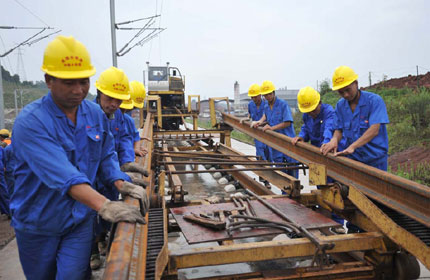Time to deepen hukou reform
Updated: 2014-07-04 11:40
By Li Yang (chinadaily.com.cn)
|
|||||||||||
Making city governments richer and supervising their use of public funds to ensure they serve the people wisely can prompt them to open the door to embrace more new residents, says an article of the 21st Century Business Herald. Excerpts:
Limited government revenues and huge government debts make the city governments reluctant to take in more new residents. But better pay, good infrastructure and a concentration of good schools and hospitals in big cities attract hundreds of millions of migrant workers to cities.
Premier Li Keqiang pointed out during his visit to the United Kingdom in June that a key issue in China’s urbanization is to give the 300 million migrant workers their overdue hukou, or legal residence rights, in the city where they have lived and worked for a long time, and let them enjoy the same welfare benefits as urban residents.
The third conference of the reform-leading team of the central government, which convened earlier this month in Beijing, also required governments at various levels to carry out the hukou reform.
A long-time knotty issue, hukou is central to China’s urbanization, governance and social stability, as well as to relations between governments of different levels.
The main resistance comes from the big cities, where the public-service levels in the fields of education, medical care and governance are much higher than small cities and towns, whose hukou is not difficult to come by today.
Governments of big cities do not want to give up on hukou. They argue that once the door is opened to the migrant population, the big cities’ maladies, such as pollution and traffic congestion, will become worse.
In fact, the city governments should think more of improving governance. The governments of many big cities in China should learn from big cities in developed countries.
The world’s history of city development indicates that higher population density in big cities means more efficient energy use and more economic activity. Yet, the expansion of urban areas outpaces the increase of the urban population in China. The country’s urbanization does not bring about efficiency. Rather, it creates wasted land, over-investment, polarized urban society and hollowed-out villages.
Natural resources, like water, and environmental capacity are two restrictive factors for population expansion in big cities, to which the governments must pay more attention.
New residents boost consumption. More people do not necessarily create burdens for smart governments.
Related Stories
Cities eye 'house-for-hukou' to boost property market 2014-06-22 14:47
Ministry strikes blow at hukou 2014-06-12 13:46
Local government denies sterilization for hukou 2014-05-22 08:28
China's urbanization stumbles over hukou 2013-12-21 00:07
Today's Top News
Gambling costs World Cup fans their lives
US supports Ukraine's decision to suspend ceasefire
It's all about making a spectacle
China likely to see 7.5% growth in second quarter
Palace Museum feeling the squeeze of visitors
Myanmar pagoda replica given to China
US sends 300 more troops to Iraq over concerns
Hong Kong at the crossroads
Hot Topics
Lunar probe , China growth forecasts, Emission rules get tougher, China seen through 'colored lens', International board,
Editor's Picks

|

|

|

|

|

|





